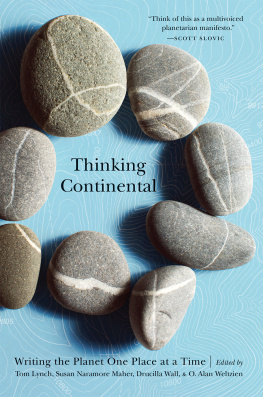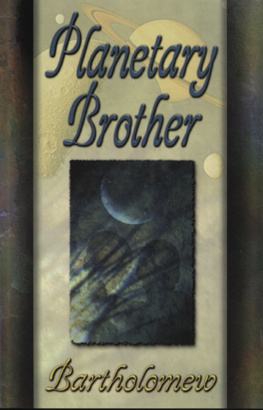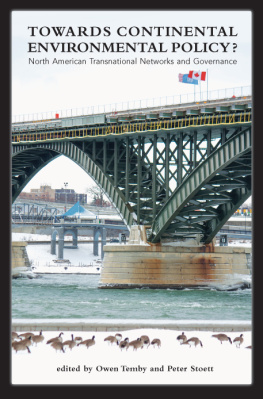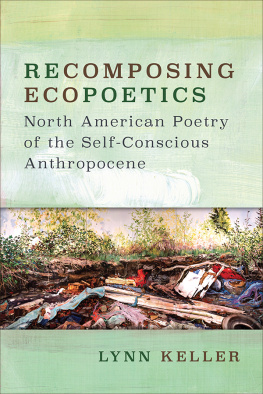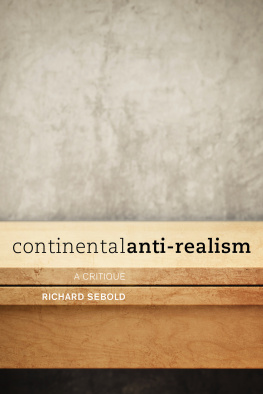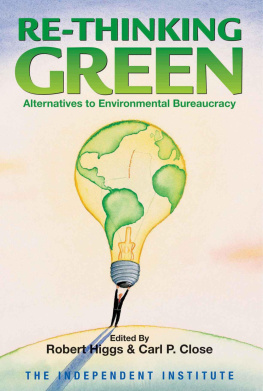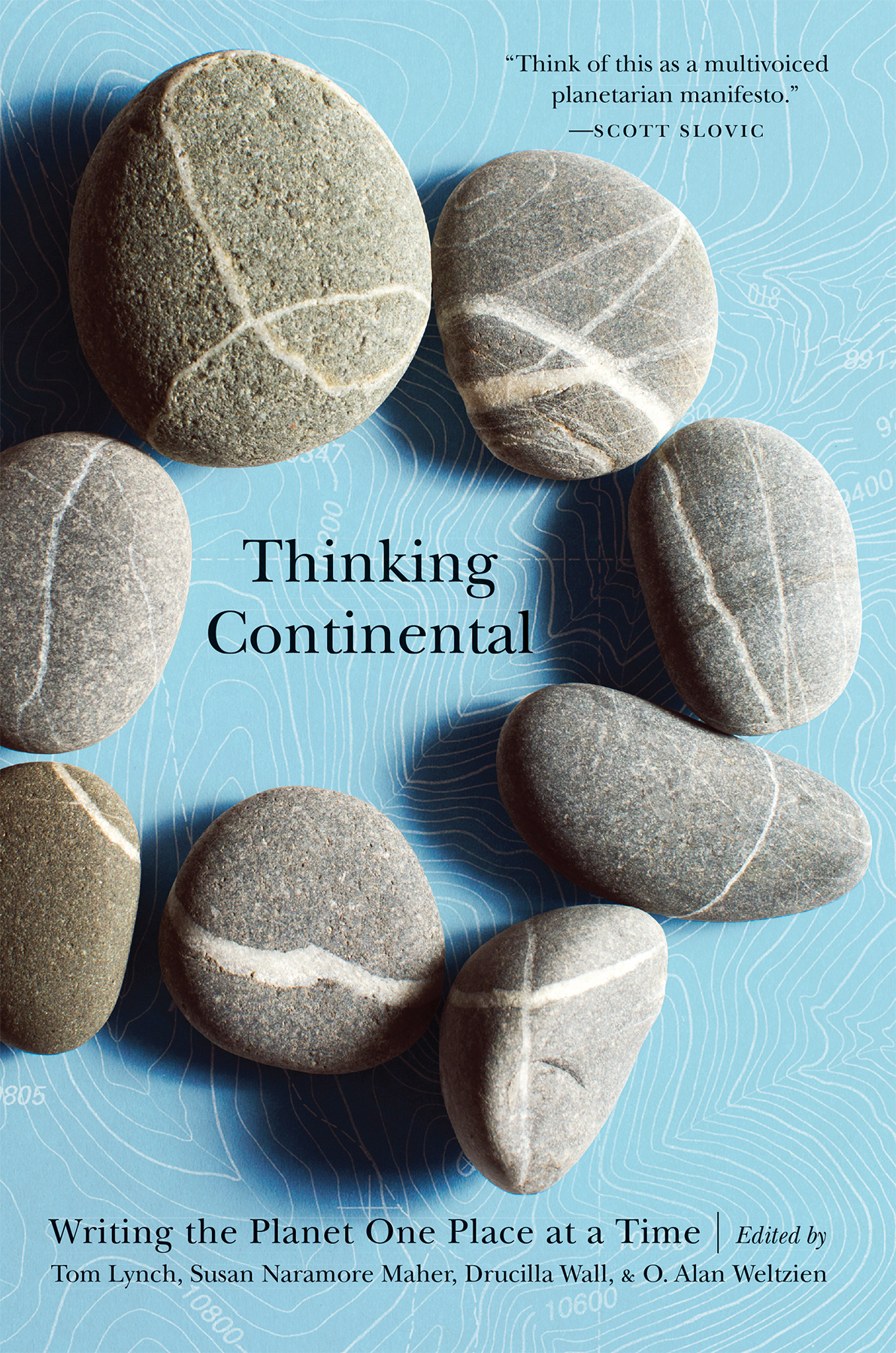
This is exactly the kind of book that helps us to understand where and who we are, what it means to be emplaced on this planet.
Scott Slovic, coeditor of Ecocritical Aesthetics: Language, Beauty, and the Environment
With the help of literature, these essays and poems lead us from personal particulars to our shared planet, and in so doing, they nourish our fi lamentary imaginations.
SueEllen Campbell, author of The Face of the Earth: Natural Landscapes, Science
Time and again I found articles, essays, and poems working together like facets of a prism, a succeeding work illuminating the one before it and setting up resonances with the one to follow.
Robert Root, author of Postscripts: Retrospections on Time and Place
Thinking Continental
Thinking Continental
Writing the Planet One Place at a Time
Edited by Tom Lynch, Susan Naramore Maher, Drucilla Wall, and O. Alan Weltzien
University of Nebraska Press | Lincoln and London
2017 by the Board of Regents of the University of Nebraska
Poetry in Return to Finland, Robert Creeley, Continental Drift is from Selected Poems of Robert Creeley, 19452005, by Robert Creeley, edited by Benjamin Friedlander. 2008 by the Regents of the University of California. Published by the University of California Press. Used with permission. Lines of poetry in Pathways of the Yellowstone from Gary Holthauss Circling Back (Salt Lake City: Peregrine Smith, 1984) are use with permission from the author. Lines of poetry in Life on the Western Edge of It All: Conceptions of Place in Tess Gallaghers Lough Arrow Poems are from Tess Gallaghers Oliver, in Narrative (Spring 2016), www.narrativemagazine.com/issues/spring-2016/poetry/oliver-tess-gallagher and from Midnight Lantern: New and Selected Poems (Minneapolis: Graywolf Press, 2011) are used with permission from the author.
Cover designed by University of Nebraska Press; cover image Stocksy United.
All rights reserved.
Library of Congress Control Number: 2016054692
The publisher does not have any control over and does not assume any responsibility for author or third-party websites or their content.
Contents
Elizabeth Dodd
O. Alan Weltzien
Harmon Maher
Nessa Cronin
Fabiana Dimpflmeier
Andrea Benassi
Jess Allen and Bronwyn Preece
Aliki Barnstone
Alberto Ros
Greg Delanty
Twyla M. Hansen
Susan Millar DuMars
Kimberly Blaeser
Kimberly Blaeser
Colm Tibn
Tess Gallagher
Dawn Dupler
Michael Heffernan
Christine Casson
O. Alan Weltzien
David Brannan
Tom Lynch
Brendan Galvin
Susan Naramore Maher
Bernard Quetchenbach
Rick Van Noy
Mary Swander
Emilio Cocco
Pam Uschuk
Twyla M. Hansen
Ann Fisher-Wirth
Brendan Galvin
David Lloyd
William Logan
Michael S. Begnal
Barry Johnston
Tony Curtis
Major Jackson
Alice Azure
Nancy S. Cook
Drucilla Wall
Eamonn Wall
Joel Weishaus
Marjorie Saiser
Heid E. Erdrich
Walter Bargen
Greg Delanty
Aliki Barnstone
Walter Bargen
Linda Hogan
Linda Hogan
Katherine Soniat
Daniel Tobin
Joan McBreen
Tess Gallagher
Kelly Cherry
Walter Bargen
An Alignment of Stones
Tom Lynch, Susan Naramore Maher, Drucilla Wall, and O. Alan Weltzien
In his book Staying Put: Making a Home in a Restless World (1994) Scott Russell Sanders argues passionately that people should find a congenial place to live and then root themselves deeply into it, resisting the blandishments and professional allure of constant mobility. He argues that such an approach is best for both human communities and the natural world. Wendell Berry has made a similar proposition for decades throughout his vast corpus of volumes. While many readers have been inspired by such arguments, and certainly there is much to recommend them, the perspective offered by Sanders and Berry has also been criticized. Their staying put ethos, the argument goes, is a potentially provincial and narrow privileging of local knowledge and identity over the more global, cosmopolitan, or planetary perspectives that represent the world we really live in and the scale of the environmental threats we really face. The staying put arguments are sometimes portrayed, whether fairly or not, as a kind of nostalgic retreat from the complexities of an increasingly globalized planet.
This dichotomy is well represented by the title of Ursula Heises book Sense of Place and Sense of Planet: The Environmental Imagination of the Global (2008). Heise decries the essentialism that often limits discussions of place and argues that remaining in one place for many decades, taking care of a house or farm, intimately knowing the local environment, cultivating local relationships, being as self-sufficient as possible, resisting new technologies that do not improve human life spiritually as well as materially are options no longer available to many. Indeed, astronomers speak of a local group of galaxies.
Its perhaps not a coincidence that the proponents of localism are more likely to be North Americansfrom the United States or Canadawhereas the skeptics of localism tend to be, like Heise, more internationally inflected. Sanders, Berry, and others of the localist persuasion are responding to specific North American circumstances. In nations composed to a large degree of settler colonial immigrants, and in which people move from place to place with remarkable ease, it makes sense to see many social and environmental problems as products of hypermobility and a lack of rootedness and loyalty to place. Theres a strong logic at work here. But such a perspective makes less sense in, say, Europe, where many people have lived hundreds of generations in the same small region and where a sense of distinctive place-based identity and belonging to the soil has as often bred discord as harmony. For people whose ancestry in a place might go back to the Bronze Age but who are now daily battered by a deterritorializing array of globally deployed forces, the staying put argument might well seem obtuse.
In the critical move to simplify and establish easy dichotomies such as these, however, people commonly exaggerate differences and ignore complexity. Though it has become a critical commonplace to denounce binary thinking, such thinking permeates the discussion, obscuring the many ways, for example, Heise expresses sympathy for rooted local knowledge and Sanders acknowledges the need for global awareness. We can live wisely in our chosen place, Sanders avers, only if we recognize its connections to the rest of Mitch Thomashows book Bringing the Biosphere Home makes a comparable argument. Thomashow links backyard to biosphere and shows how knowledge of planetary ecological processes informs ones local awareness and, crucially, vice versa. His phrase cosmopolitan bioregionalism may seem an oxymoron to those who prefer to think in binaries, but it makes perfect sense if one understands the essential interconnectedness of local and planetary. Heises comparable term, eco-cosmopolitanism, approaches the same insight from a different direction. If we think of the cosmo in both formulations to mean not simply the urban, with which it is often conflated, but the planetary (and in some senses, after all, the cosmic), then the distinction between Heises planet and Thomashows biosphere seems more a matter of emphasis than kind; and though one might be identified as a bioregional localist and the other a cosmopolitan globalist, in fact their commonalities outweigh their differences.

